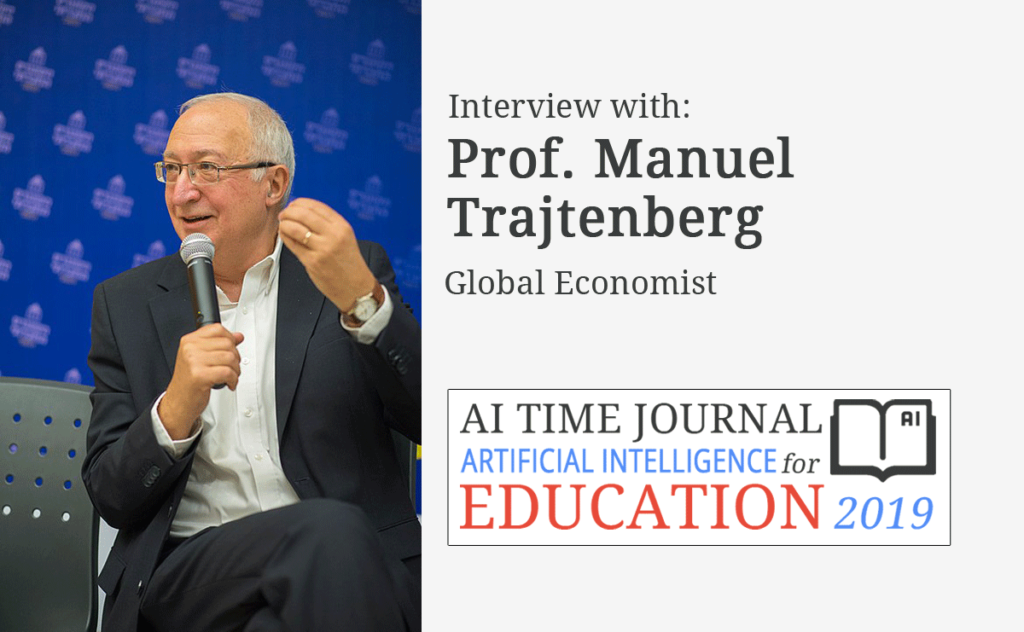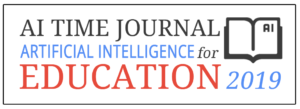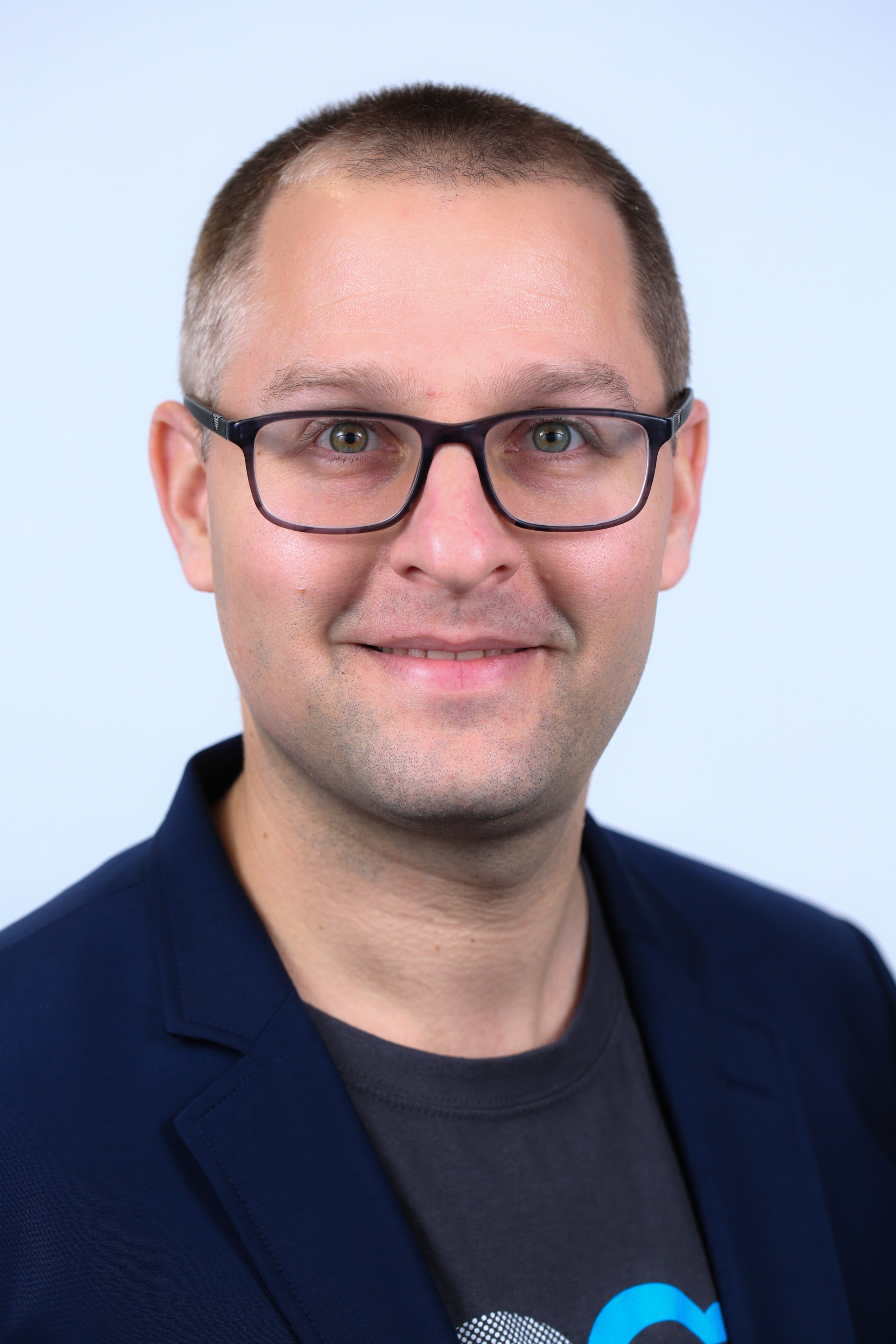
When I joined the “AI in Education” committee a while back, I thought of ways to broaden my perspective on AI and specifically on AI in Education. I thought of thought leaders and key influencers in my area I can have a short discussion about this important topic and get a fresh feed of ideas and perspective. Luckily for me, I was able to sit with Prof. Manuel Trajtenberg and have a long conversation about AI in Education and how our lives will change because of it. Manuel Trajtenberg is currently engaged in drafting a progressive socio-economic agenda for Israel, to address some of the most pressing social challenges of these troubled times. He is a professor of economics, a former member of the Knesset for the Labor Party, and held prominent positions in the public sector.
This interview has been
featured in the AI for Education Initiative 2019.

“AI is going to change our lives in ways we don’t even understand”
Prof. Trajtenberg
When talking about Artificial Intelligence Prof. Trajtenberg refers to it as a G.P.T – General Purpose Technology. Previous GPTs include the steam engine, railroads, electricity and in recent years the computer and of course the internet. “Those technologies are not meant to serve one particular purpose but the whole range of potential sectors can use them; the power of these technologies is revealed not by just adopting them, that’s the easy part but by the fact that once you adopted them – you change the way you do things.” says Trajtenberg. “Think of the Internet and you know what happens with banking and traveling and airlines and whatever you touch it has changed dramatically.”
We are only at the beginning of AI
“We are at the beginning of AI so everything we say is speculative and we may be proven wrong, but essentially when you think of it deeply, each one of these GPTs performs much better, more efficiently, more systematically and so forth”. Every technology in the past came to replace simple functions humans did but in a more systematic and efficient way. For example, we started with the physical activities where the steam engine came to help with pumping water or navigate through the ocean. “As we advance in time, with Artificial Intelligence, the functions that are being replaced are more sophisticated and more activities can be removed from the purely physical world.”, says Trajtenberg. “And we have arrived at this critical junction. Where what characterizes us as humans (one of the characteristics) is our ability to reason. And to make decisions that are based on reason.” He adds. The reason, according to Trajtenberg, is the ability to take calculated decisions based on data. A.I. is doing exactly that. “AI is tackling the process of making a decision in a particular way in view of data (massive amounts of data). You need to acquire information regarding the present circumstances and the past circumstances. When you think of it, that’s a huge revolution. “And this essentially is again taking something that we took for granted as purely human and now machines can do it.”
And what about AI in Education?
The questions that we need to ask ourselves is why we do it. The current model of education was started between 150-200 years ago as part of the 1st and 2nd industrial revolutions and has not been changed until today (in most countries). At the time, the education system had a dual purpose: creating the human capital to go with the industrial revolution and to serve as a key element in creating the nation state in those countries. Trajtenberg, who grew up in Argentina still remembers the uniforms he had to wear from kindergarten to support uniformity across all students. Nowadays, this model is simply wrong. “This (education) model is not only passive but simply wrong in a fundamental way.” “Each one of us is different and is different in fundamental ways. The objective should be that each child and each young guy, essentially [needs to] maximize or create the opportunities and the conditions for him or her to maximize their potential. And what these potentials are varies enormously.” In today’s world, you can’t have uniformity and this is what we are still doing today. “You have one curriculum, one blackboard, one teacher, 30 students everything is one and everything is exactly the same except for the margins. “This is exactly where AI comes and can save the education system as we know it today. “AI has the potential to provide a technological platform for a real personalized education” says Trajtenberg. Trajtenberg predicts that in a few years, we can expect that each student will get their own data-driven personalized curriculum in their own phone by a click of a button. Trajtenberg gives a practical example from today. “Take the MooCs (Massive Open Online Course) for example. You can take the data gathered by the clicks, pause actions, video speed, etc. and then process those by machine learning and predict the final score of the chapter.” Another example Trajtenberg thinks should be a thing of the past is exams. “For most parts, the message of exams is bad. “ Think of the bottom part of the grades in class. “You know you got the worst grade in the class. Therefore, you already know in school that you are going to be at the bottom of the pyramid in society. There’s a huge range of other skills and capabilities that are not being tested. And the only message you give throughout the school system is that you are the worst.” And here is another way AI can help and improve. “There is a need to evaluate in order to improve and AI can do that because it can detect strengths and weaknesses in a very individualized way and work only on what’s needed to be improved. “
Innovation will come from the industry, not the governments
“AI requires by definition huge amounts of experimentation, innovation and entrepreneurship. And the government can’t lead these sorts of processes that require experimentation and constant innovation. “Governments are built to work in a repetitive way or in a very large scale and this is why we can’t expect them to run faster with those important innovations. “Eventually governments will have to adapt. They would have to adapt, maybe in ways that we don’t even imagine. “, concludes Trajtenberg. “This is a really exciting time to promote innovation and entrepreneurship by everybody. We never know where it is going to come from. But I know that it is not going to come from the government in the near future. “
Adaptability is the skill of the future
We finished the discussion with a question about the future. I asked Prof. Trajtenberg: “what is the one skill you would recommend any student to master for a better future?”. His answer was concrete and short: “Adaptability to change”. Your ability to adapt in a wider sense and in the sense of that you react very quickly. You keep going, you acquire additional knowledge and skills to keep you “on the horse”: that’s incredibly important.”
To conclude, I’m often asked about the future of the workforce and which jobs will disappear because of AI and whether some of us should worry. My answer is simple, just like a 100 years ago when the first car replaced the horse, and many horse related jobs were replaced by car related jobs – the human race and the workforce will be able to adapt to the new reality of AI and new jobs will appear as well.
